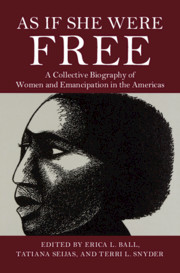Book contents
- As If She Were Free
- As If She Were Free
- Copyright page
- Dedication
- Contents
- Figures
- Contributors
- Elizabeth Catlett and the Form of Emancipation
- Acknowledgments
- Introduction
- Part I Claiming Emancipation during the Rise of New World Slavery
- Part II Experiencing Freedom during Slavery’s Expansion
- 7 Judith and Hannah: Eighteenth-Century Florida, South Carolina, and Virginia (US)
- 8 Sarah Chauqum, Eighteenth-Century Rhode Island and Connecticut (US)
- 9 Marion, Eighteenth-Century Natchitoches, Louisiana (US)
- 10 Anna Maria Lopes de Brito, Eighteenth-Century Minas Gerais (Brazil)
- 11 Juana Ramírez, Eighteenth-Century Oaxaca, New Spain (Mexico)
- 12 Juana María Álvarez, Eighteenth-Century New Granada (Colombia)
- 13 María Hipólita Lozano, Eighteenth-Century Lima (Peru)
- Part III Envisaging Emancipation during Second Slavery
- Part IV Enacting Emancipation in the Aftermath of Slavery
- Bibliography
- Index
8 - Sarah Chauqum, Eighteenth-Century Rhode Island and Connecticut (US)
from Part II - Experiencing Freedom during Slavery’s Expansion
Published online by Cambridge University Press: 24 September 2020
- As If She Were Free
- As If She Were Free
- Copyright page
- Dedication
- Contents
- Figures
- Contributors
- Elizabeth Catlett and the Form of Emancipation
- Acknowledgments
- Introduction
- Part I Claiming Emancipation during the Rise of New World Slavery
- Part II Experiencing Freedom during Slavery’s Expansion
- 7 Judith and Hannah: Eighteenth-Century Florida, South Carolina, and Virginia (US)
- 8 Sarah Chauqum, Eighteenth-Century Rhode Island and Connecticut (US)
- 9 Marion, Eighteenth-Century Natchitoches, Louisiana (US)
- 10 Anna Maria Lopes de Brito, Eighteenth-Century Minas Gerais (Brazil)
- 11 Juana Ramírez, Eighteenth-Century Oaxaca, New Spain (Mexico)
- 12 Juana María Álvarez, Eighteenth-Century New Granada (Colombia)
- 13 María Hipólita Lozano, Eighteenth-Century Lima (Peru)
- Part III Envisaging Emancipation during Second Slavery
- Part IV Enacting Emancipation in the Aftermath of Slavery
- Bibliography
- Index
Summary
In 1732, a twenty-three-year-old enslaved woman named Sarah Chauqum ran away from New London, Connecticut and headed for South Kingstown, Rhode Island. In two successful pathbreaking legal actions, Sarah and her lawyers not only exposed the seamy regional system of human trafficking that turned free people of color into slaves in New England, but also laid the groundwork for freedom suits that would follow. In the first, Sarah established her legal freedom. In the second, Sarah filed what is possibly the first reparations case in New England—and won. In the process, Sarah also reclaimed her Indigeneity from her owners’ intentional efforts to erase it by categorizing her as a person of African ancestry. Sarah's post-escape success in claiming freedom created the legal files that contain what we know of her history, which is not much. The story of her enslavement helps us understand the larger phenomenon of Indian slavery in the colonial period. It also points to the ways in which Indian slavery and the slave system more broadly in New England changed as the number of enslaved Africans imported to the region grew over the course of the eighteenth century.
- Type
- Chapter
- Information
- As If She Were FreeA Collective Biography of Women and Emancipation in the Americas, pp. 151 - 170Publisher: Cambridge University PressPrint publication year: 2020



